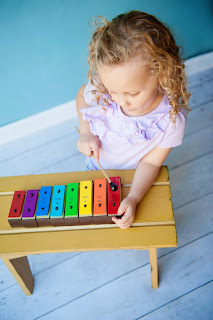Family: At the Heart of It All
No other social institution has as much impact on society as the family, and no one influences our students more powerfully than their families. Not surprisingly, our amazing successes in teaching young students come about in large part because we recognize that families play a key role in children's lives as they establish habits, tastes, and values on the road to independence. If the household has an attitude that "music is what we do" and "it's fun to play musical games" and "we relax and unwind with music", the children adopt those viewpoints! We really care how your family feels about music, and we really care that you are connected with your child!
Our goal in teaching music is to create musicians, but we also hope these three very special years give you a chance to strengthen your family and build some special connections with your child. Even if your little one does not go on to a musical career, she'll have a special memory of these happy times with you!
A Strong Family
Whatever structure your family has, you'll be spending time together, solving problems, and taking care of each other. That's good for life and it's good for music-learning. Here are some characteristics of what might identify you as a strong family:
- Adaptability: We cope with everyday and unanticipated stressors.
- Appreciation: Individuals feel and show appreciation of each other. We care about the well-being and needs of each member.
- Clear Roles: We're aware of rules, roles, expectations and responsibilities, yet flexible.
- Commitment: We're committed to the family, and have a shared purpose and values.
- Communication: We can communicate openly and honestly with each other in a safe and positive way. We're willing to listen to each member's views, and we resolve conflicts when they arise.
- Community Ties: We are connected to, and participate in, our community
- Encouragement: Individual development is encouraged
- Shared Time: Both quality and quantity time are shared. We are willing to spend time and energy meeting the needs of our family or problem-solving to improve our family.
Here are a few strategies that can help you strengthen your family, and I'll shamelessly suggest how participating in Let's Play Music can help you cultivate relationships with your children.
- Spend time alone with each child, each week: Quiet chats just before bedtime or a puzzle together after school ... and how about making a special weekly date for just you and your child to get LPM homework done and have some time to sing and snuggle? Your child will also value that you leave the siblings behind so you can go to class with just her and interact with her during class, then help her practice (the first couple practice sessions each week).
- Respond to children with patience and respect their feelings and abilities: I can guarantee that at some point, your student will be frustrated with mastering a tough piece of music. You will practice using empathy and respecting his struggle. He'll know you understand him. You'll connect over the difficulties, struggle through together, and experience such joy when the song is finally perfect! Helping your child get through something tough is fabulous! You'll both remember it and it will set a tone for how you respond to his struggles.
- Encourage family members. Share their accomplishments. You'll cheer delightedly with each small musical accomplishment all year. You'll help her prepare for the big recital and invite everyone you know to come. You'll take proud videos of her composition and brag on Facebook. She knows you are her number 1 fan.
- Visit and find ways to help at your child's school or activities. Get involved in something she does, and suddenly it's not her thing but your thing together. Coming to LPM class, helping her practice, and learning to play duets with her can't be beat! She'll remember it as time with you.
- Eat a meal together as a family, and involve family members in mealtime tasks. LPM won't teach you to cook, but I strongly recommend that you sing together as you set the table and/or put on some music you all enjoy.
- Hold family meetings that give all family members an opportunity to talk. Maybe at your next meeting, you'll have the kids weigh in on what practice plan (link for ideas) they would like to follow.
- Develop a family mission statement that includes your family's mission, goals, and objectives. I don't know what your goals are, but I bet they will affect your music practice. If "We strive to help each other" is on there, siblings might be prompted to help each other with practice time. If "We develop and share talents" is a goal, kids might be inclined to volunteer their music skills in the community or church. If "We respect each other" is your mission, you can encourage the kids to take turns nicely at the piano.
- Develop and maintain family traditions and rituals. Tell me what your musical traditions are in the comments! I want to know! Is it: We sing together while we drive in the car; We always practice music before school; We listen to classical music at bedtime; We always have music playing while we set the table for dinner; We always put on a puppet show on Sunday afternoon; Dad always plays soothing piano at bedtime; Mom always brings her guitar on camp-outs; Mom always plays with Sally in music class; Dad always sings in the choir. Having traditions can really define your family as your own, and let your children know there's a culture they belong to. If you don't have a musical family tradition yet, the good news is: it's never too late to start! Add music into your life and find out what your family want to do over and over...and it suddenly becomes a tradition.
Connect Through Music
Now that you know we strive to make music-class time a really special time for you and your child, I hope you'll go to class with a can-do attitude: "I'm gonna seize opportunities to connect with my kid during class!"
Here's an analogy: most parents stand BEHIND their kids while pushing them on a swing. Sure, the kiddo enjoys a super-fun ride and enjoys having Mom at the park. Some parents get more connection: they stand in FRONT of their kid while pushing. That way they can make eye contact and smile every time the kiddo swings past.
But, finally, SOMEONE went and took it to an epic level by inventing a swing that lets Mom get the most connection by actually participating in the fun. Mom still smiles and makes eye-contact, but she also subtly teaches: "This is a fun thing to do. I like to do this thing with you and I like doing this because I'm with you. I like to participate/ learn/ practice this skill, and I invite you to join me."
Being on that double-swing is like going to music class and actually singing along to the songs! It's like doing the solfege hand-shapes and smiling at your child when you see she's doing them, too. It's doing your best Frog-in-the-Middle dance and not worrying about sweat during Johnny's Haircut. It's being just a bit silly and being totally present, because you want to be there with your child. And if you don't like skipping to Sally Goes Round the Moon? Tell yourself, "I like doing it because I am doing it with you."
Three Things To Try In Class
Show your kiddo that he's your V-A-L-E-N-T-I-N-E by giving him some love with these three classroom ideas:
1. MORE HUGS: You'll be sitting directly behind your child during floor time. He can't always see you but for sure he can hear you singing along. Look for opportunities to add in the hugs! After he answers a question, or puts a magnet on the board, or answers Echo Ed, give him a big smile and hug. Silent and easy. It works at the keyboard, too: after she plays a piece, answers a question, or echoes Edison, give her a squeeze or touch foreheads to silently say "I heard that!"
2. SOLFEGE HIGH-FIVES: Soflege hand-shapes are fun and silly. I posted the solfege high-fives HERE as a fun way to teach hand-shapes, but I hope you'll use them in class all the time! Whenever you find a chance, silently tell your kid "Nice job!" by giving one of these high-fives. It's like a secret handshake between the two of you...you hold out two O-shaped hands, and she knows to plant her FA-lower (flower) thumbs into the pots and bloom those flowers. It all happens silently and quickly and is a special moment between the two of you. A stranger on the street is not in-the-know about your secret handshakes!
3. SOLFEGE KISSES: You may not have seen this before because solfege kisses are pretty intimate- which is why they are perfect for you and your child! Put your cheekbone against his so that your mouth is near his ear and his mouth is near your ear. Very quietly sing "Sol-Mi" and have him echo "Sol-Mi". Vary with "Do is Home" or "Sol-La-Mi" and other patterns. Anytime (at home) you'd like some snuggles with your kiddo, announce "solfege kisses!" and do a few singing exercises. You'll be able to hear and feel these notes being sung.
Since your face is almost in position, you could top it off with some butterfly kisses, but of course you'll want to blink in rhythm while chanting "caterpillar, grasshopper, BUTTERFLY, bug!" (Bring your eyelashes close enough to touch his cheek, then blink your eye so the lashes brush and tickle his cheek and feel like butterfly wings flapping against his skin.)
Okay! Go have some fun singing the V-A-L-E-N-T-I-N-E songs, and maybe give a bit of extra oomph this month toward building a bond with your child. Our track record indicates that when you are connecting with and having fun with your child, his music-learning increases!
-Gina Weibel, M.S.
Let's Play Music Teacher
Since your face is almost in position, you could top it off with some butterfly kisses, but of course you'll want to blink in rhythm while chanting "caterpillar, grasshopper, BUTTERFLY, bug!" (Bring your eyelashes close enough to touch his cheek, then blink your eye so the lashes brush and tickle his cheek and feel like butterfly wings flapping against his skin.)
Okay! Go have some fun singing the V-A-L-E-N-T-I-N-E songs, and maybe give a bit of extra oomph this month toward building a bond with your child. Our track record indicates that when you are connecting with and having fun with your child, his music-learning increases!
-Gina Weibel, M.S.
Let's Play Music Teacher






























